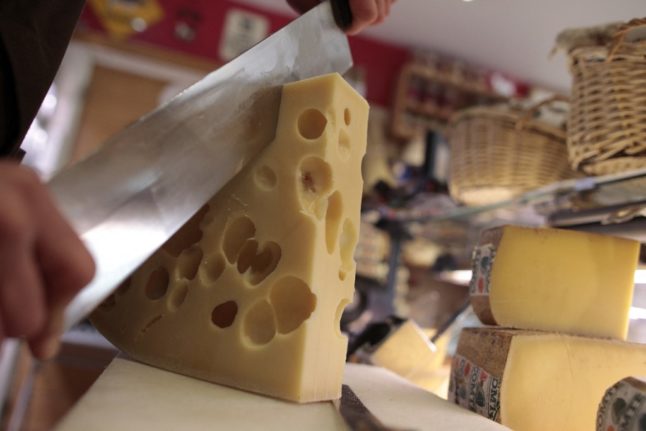Makers of the country’s iconic Emmental and Gruyère cheeses have been locked in legal battles to protect their product from inferior foreign imitations.
Named after the Bern’s Emmental valley where it is produced, the Emmental cheese has a distinctly mild and nutty taste and is also the only Swiss cheese with holes, which “range from the size of cherries to the size of nuts and are formed during the maturation process”, according to Switzerland Cheese Marketing board.
In Switzerland, the Emmental is protected by an AOP — Appellation d’Origine Protégée, which means the product is entirely made in its region of origin.
This label also means the cheese must meet strict criteria, such as the size of the holes, which should ideally be between two and four centimetres in diameter.
However, the Emmental is also made in France and Germany, but Swiss producers claim foreign cheese does not meet the same exacting standards and has little to do with the original recipe.
They have been fighting for years for better protection of the brand manufactured and sold outside Switzerland, but to avail: the European Intellectual Property Office (EUIPO) ruled that “Emmental” doesn’t designate the geographical origin of the product, but only a certain type of cheese with holes.
This decision really cheesed the Swiss off and they filed a complaint against EUIPO’s decision with the General Court of the European Union, which will begin deliberations in September.
READ MORE: Ten varieties of cheese you should be able to identify if you live in Switzerland
However, the Emmental is not the only Swiss cheese caught up in an international legal tangle; Gruyère suffered a similar fate.
An American court ruled in January 2022 that ‘Gruyere cheese’ does not have to be made in the Gruyères region — or even in Switzerland, for that matter —in order to bear the name.
Swiss cheesemakers said they would appeal the US ruling, but in the meantime the verdict grates on their nerves.
“Gruyère represents a centuries-old traditional recipe, and a region of Switzerland,” an angry Philippe Bardet, director of the Association of Swiss Gruyère Producers, told Switzerland’s Blick newspaper.
“When consumers buy a Gruyère in the United States, they have no idea what awaits them”, he said. “Does the cheese have holes? What milk was it made with?”
Bardet pointed out that Swiss Gruyère producers use only raw milk from cows that eat natural food — pasture grass in summer and hay in winter .
But in America, “they use cheap milk”, he said.
READ MORE: Why are Swiss angry with Americans about Gruyere cheese?



 Please whitelist us to continue reading.
Please whitelist us to continue reading.
Member comments